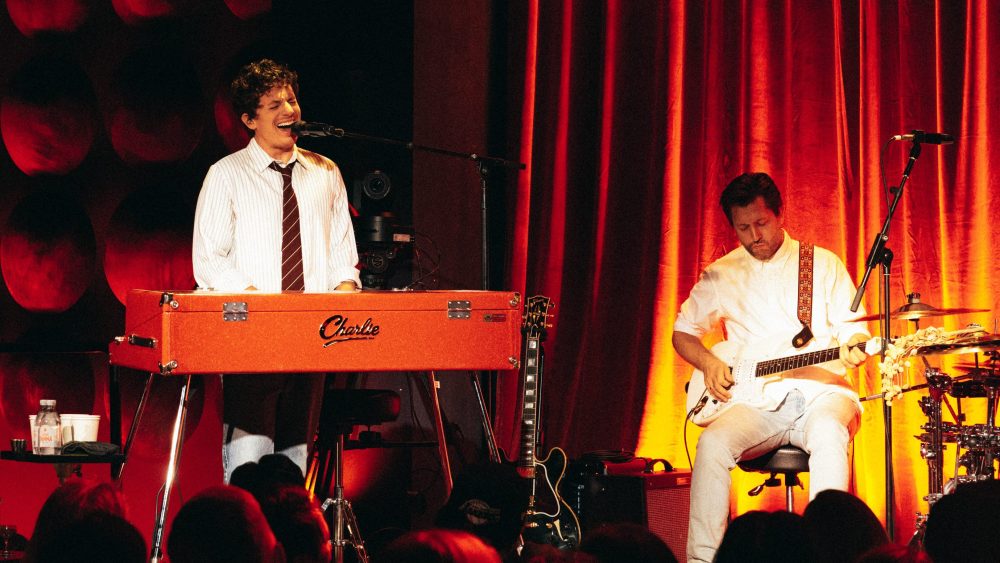Shortly after Charlie Puth took the stage for the first of his four-night residency at Los Angeles’ freshly-opened Blue Note, he shared his intentions with those in attendance and the thousands watching on a TikTok livestream. “We’re going to play these songs in the original way that I concocted them in my head,” he said. “Whenever I write anything, it comes from a jazz perspective, because I love jazz so much.” (He accented those last words with chameleonic jazz chords to drive the point.) “You can only put so much into a pop song, but you can trick the listener into appreciating jazz-isms in your pop music, which is something I’ve always taken pride in doing.”
For the casual listener, Puth has established himself as the sort of outré pop savant whose songs are too meticulously structured to dismiss. Since the release of his 2016 debut album “Nine Track Mind,” he’s consistently shaved down the edges of pop convention to approach an idealized version of the earworm, creating tracks so immediate that in one way or another, they thrust their way into mainstream consciousness, trends be damned. It’s happened regularly over the past decade, from the love-it-or-often-hate-it “Marvin Gaye” to the funk-snapped “How Long” and “Attention” to the TikTokian “Light Switch,” a song that he materialized in real time on social media to the delight of fans yearning for connection to the outside world amid Covid lockdowns.
But none to the surprise of Puthers, at the heart of his discography is a fundamental understanding of music theory, more specifically jazz composition. One of Puth’s greatest talents is constructing songs that sound simple but are powered by dynamic chord switches and deceptively complicated harmonies. It’s no secret that he has perfect pitch — it’s become a running gag at this point — but it’s his fundamental understanding of subtle tonal shifts and modulation that deepens his music, creating a sense of propulsion that rooms of songwriters regularly attempt to chase.
Puth often does this all on his own, lifting the curtain on his process on social media and, more recently, becoming pop’s artist-in-residence with his Professor Puth series. (His latest manifesto on how AI could never replace the elasticity of human creativity is worth a watch.) He is, quite frankly, a music nerd. His latest single “Changes,” which he released yesterday and honored with a coronation as the Blue Note set’s closer, is yet another foray into pop’s wilderness, this time landing somewhere between Toto, Peter Gabriel and Phil Collins. It reveals another color in his crayon box, adapting tropes of 1980s pop to modern times.
And so Puth gave the Blue Note audience a glimpse into the recesses of his mind across his 75-minute set on Thursday night (the first of two performances that evening), transforming his hits and deep cuts into the alternative versions he initially envisioned. “Attention” was presented as a jazz lounge floater, all plucky guitar strings and wobbly bass notes, ultimately concluding with acapella harmonies alongside his trio of backup singers. Near the end of “Boy,” perhaps his greatest song, he transitioned into the loose, jazz improv groove of Erykah Badu’s “Back in the Day (Puff).” He introduced a breathable cover of New Edition’s “Can You Stand the Rain” as “the song we wish we all wrote,” Puth-ifying it with his trembling falsetto.
As a showman, he has had extensive practice. He’s played New York City’s Radio City Music Hall and Los Angeles’ Greek Theatre, and last year set sail for his “Something New” tour in Asia. On stage, he’s an adorable ham, so galvanized by the music that he’ll stomp his feet like he’s running in place as a song like “How Long” segues from the bridge to its explosive chorus. Yet his Blue Note show was a return to form, at least by his account, and he admitted that the tiny club setting made him nervous. “I’m not a new artist anymore, y’all are still with me,” he said. He prefaced a fleshier version of “Suffer” by detailing how he wrote it when he first moved to Los Angeles at an apartment building less than a mile from the venue. “But I feel like a new artist. These are the stages that I would play in the beginning of my career. I always knew I would do a show like this, it just happened 10 years later.”
Much has changed for Puth in the past decade. He’s leagues removed from his 2010 EP “Otto Tunes,” a very rough draft of the type of artist he would inevitably become. Yet he’s continuously refined his sound and style to put his years of training into practice. So when Taylor Swift sang that “Charlie Puth should be a bigger artist” on last year’s “The Tortured Poets Department,” she had a point — the venues may change, and the sound may evolve, but the one constant is that Puth remains singular in his pursuit of pop excellence.

